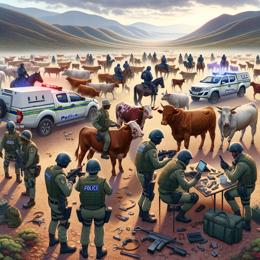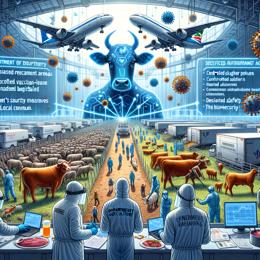Image created by AI
South Africa's Successful FMD Containment in Four Provinces
After a challenging period of managing Foot and Mouth Disease (FMD) outbreaks, South Africa can breathe a little easier as four provinces - North West, Free State, Gauteng, and Mpumalanga - have been declared free of the disease. The Department of Agriculture's announcement follows a collaborative and rigorous approach to tackle the outbreak, which lasted from 2021 to 2022.
With comprehensive testing and quarantine measures in place, affected farm animals have been cleared of the FMD virus, as confirmed by the World Organisation for Animal Health. This victory, however, does not signal the end of the battle, as KwaZulu-Natal and Eastern Cape still wrestle with their own FMD challenges. Nevertheless, a silver lining appears, as no new FMD indications have surfaced in these regions over the recent month.
Agriculture Minister John Steenhuisen has commended all the role players' for their unwavering resolve and adherence to control measures that have played a significant part in curbing the disease's spread, thereby protecting the national livestock industry.
The situation in Eastern Cape's Humansdorp area highlights the government's proactive approach, where 37 farms have been positively identified, and 38 more have undergone preemptive vaccination to inhibit further spread. Such vigorous efforts saw around 130,000 animals vaccinated province-wide.
Nevertheless, a strict quarantine remains enforced, with farms involved not to move animals, barring those destined directly for slaughter under State Veterinary oversight. Biosecurity protocols are also mandatory on these farms to mitigate any potential disease propagation.
To fortify the countermeasures, an FMD Disease Management Area (DMA) was established, encompassing parts of the Kouga and Kou-Kamma Municipalities. Strict controls on animal movement within this DMA are in effect, with veterinary permission required in multiple scenarios.
Furthermore, the agriculture department, in unison with law enforcement and Agri-Eastern Cape, remains vigilant against illegal animal movements — a stark warning for those opting to disregard regulations.
East London has seen successful containment efforts, and this could not have been achieved without the cooperation from local famers. Designated abattoirs are safely slaughtering animals, ensuring FMD does not taint local market offerings.
Looking ahead to the festive season, the department urges holidaymakers to respect biosecurity boundaries, steering clear of quarantined farms, and abstaining from transporting live animals or related products from these locales.
Nationwide, livestock farmers are encouraged to minimize animal movement, a step emphasizing the importance of the FMD incubation phase, where seemingly healthy animals might still carry and spread the virus. Under the Animal Diseases Act, farmers bear responsibility for preventing the disease from spreading. Reporting any unusual symptoms to state veterinarians and not moving such animals is crucial.
As South Africa inches towards complete eradication of FMD, the collaborative spirit and strict biosecurity practices serve as the cornerstone of this public health victory.










